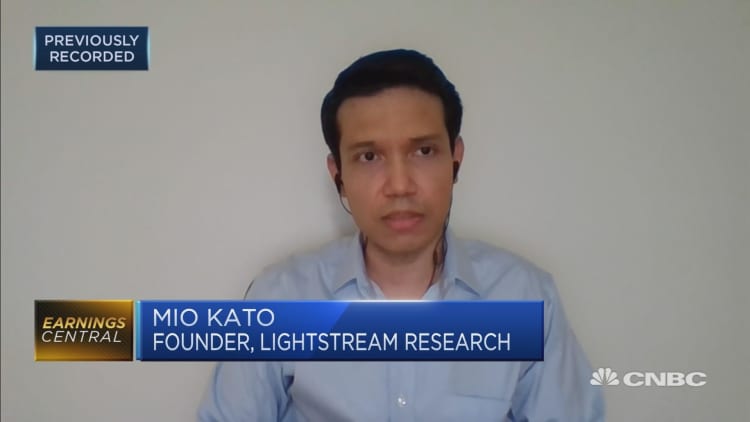The future of SoftBank's second Vision Fund is in jeopardy after the first one reported record losses of $18 billion on Monday — thanks in large part to the collapsing valuations of firms like Uber and WeWork, which SoftBank has pumped billions into.
The first Vision Fund, launched by SoftBank founder Masayoshi Son in 2017, shocked the tech investment community due to its sheer size. At $100 billion, it was several orders of magnitude larger than any other tech investment fund including those of Silicon Valley heavyweights like Sequoia and Andreessen Horowitz. More than half of the money comes from contributors like Apple, Qualcomm, Oracle founder Larry Ellison, and the Public Investment Fund of the Kingdom of Saudi Arabia.

In July 2019, SoftBank shocked tech investors again when it announced plans to create a $108 billion "Vision Fund 2" to invest in artificial intelligence (AI). The SoftBank Group pledged to commit $38 billion to Vision Fund 2, while Apple, Microsoft and Foxconn were all touted as external contributors that would commit the extra billions.
Vision Fund 2 is up and running but only with the $38 billion from the SoftBank Group. It made around five investments in the first quarter of 2020 including a $250 million bet on pharmacy start-up Alto. The second Vision Fund is less than half the size of what SoftBank said it would be and its future now hangs in the balance.
"The performance of Vision Fund 1 is not that great, therefore we decided not to do the marketing for Vision Fund 2 for the partners for a while," Son said on an earnings call earlier this week.
He added: "If the performance is not very good then of course the money for Vision Fund 2 cannot be asked for."
Son, who compared himself to a misunderstood Jesus Christ, while defending his investment strategy, said that he won't try to raise capital from other companies and individuals until companies in Vision Fund 1 start performing better.
Vision Fund 1 has made big bets on a raft of companies including Uber, ARM, Slack, WeWork, Oyo, Improbable and GetYourGuide. In less than three years, the Vision Fund has backed 88 start-ups with a total of $75 billion. The Vision Fund reported annual losses of $17.7 billion on Monday for the year leading up to March 31, while the SoftBank Group reported annual losses of $13 billion.
SoftBank has written down WeWork's valuation from $47 billion a year ago to $2.9 billion today, while Uber's valuation has also collapsed by over $10 billion in the last year.
Cold feet
The Abu Dhabi state investment company, Mubadala, contributed to the first Vision Fund but it is yet to confirm whether it plans to back the second fund. In September, Reuters reported that Mubadala was planning to invest in Vision Fund 2 in the fourth quarter but nothing was announced. A Bloomberg report in October revealed that Mubadala was "undecided" on the investment.
"Mubadala are super spooked by the performance and obviously they have been an important backer," said a tech investor with knowledge of the situation, who wished to stay anonymous as the Vision Fund is a potential downstream investor for their portfolio companies. "Softbank is too ill-disciplined. Unfortunately though there aren't lots of great options to park your billions somewhere."
A spokesperson for Mubadala wasn't immediately available for comment when contacted by CNBC.
Mubadala isn't the only one that's hesitant, according to Mark Tluszcz, CEO at Mangrove Capital Partners. "It is highly unlikely that they will find any takers for Vision Fund 2," he said. "While the strategy was smart, the execution was poor, as per their latest published results. They need to deliver results, put in place better governance and re-instill faith in their model."
Martin Mignot, a partner at venture capital firm Index Ventures, isn't quite so downbeat. "We still don't know whether Softbank's underperfomance is due to their strategy (too much capital) or their execution (the wrong investments/ valuations)," he wrote on Twitter.
"Raising a ton gave them great dealflow overnight which was a smart way to break through so I suspect the model can work."
Headquartered in a traditional townhouse in London's exclusive Mayfair district, the SoftBank Vision Fund has grown to several hundred people worldwide. It's led by CEO Rajeev Misra, a former banker with Deutsche Bank.
In an exclusive interview with CNBC earlier this year, Misra said the Vision Fund shouldn't be judged by a few early mistakes and that the portfolio will be redeemed in 18 to 24 months. "I guarantee you will see the outcome of our investments will change," he said.
He added: "We've made many mistakes, which is normal. We learn from our mistakes and are incorporating what we learn back into our process as we embark on Vision Fund 2."
But then the coronavirus struck, leaving many of the Vision Fund's bets in an even worse situation than they were already in.
Several high-ranking employees have joined and left the Vision Fund over the last three years, while Alibaba CEO Jack Ma is stepping down from SoftBank Group's board in June.
Son said that Ma decided to leave SoftBank's board "on his own." He added: "That's sad, but we still keep in contact directly and right before the Covid-19, we met face-to-face every month to have dinner, to talk about businesses, to talk about lives. And we will remain friends for the rest of our life, I believe."

